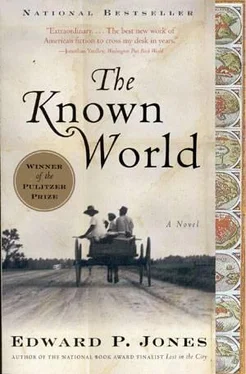Three weeks before, the morning after Minerva’s fifteenth birthday, Skiffington, going out to work, had seen her getting dressed in her room. She had apparently gone to dump her slops and had returned to finish dressing and left the door ajar, the way she had been doing it since a little girl. In the instant he saw her, her nightgown was pulled tight around her and the fullness of her body, from her breasts to her knees, showed through. She did not see him and he left without saying anything, but she had been on his mind ever since. He knew many a white man who had taken black women as their own, and among those men, he would have been thought normal. But he saw himself living in the company of God, who had married him to Winifred, and he believed God would abandon him if he took Minerva. And Winifred would discover what he had done, even if Minerva never said a word.
He put off reading the Bible as it was doing him no good and got to the jail about seven that night and the place was dark until he lit the lanterns. There were no messages from Counsel and so he suspected the day had gone without event. He had been uncertain about Counsel from the beginning. Now his faith in him had crumbled further. He brushed down his horse and left him in the barn in the back and walked home. Minerva was sitting in the porch swing and she waved to him and he felt all over again that feeling he had had the morning he saw her after her birthday. What good had all the praying done? Why should a man feel this way about someone who was like a daughter to his heart? “Howdy,” he said. She said, “You hungry?” “No. Where is Winifred?” “Inside sewing.” He went in and was suddenly pulled down by the weight of the day and the long ride. The tomatoes in Mildred’s basket were large and quite ripe. He would have liked one at that moment, but he knew his stomach would protest. The weight of the day pulled him down to Winifred in her chair and he sat on the floor beside her. She put her sewing in her lap. “I think your stomach could use something to eat,” she said. “No. Nothing.” “I say yes, Mr. Skiffington.” “Let me start with a little milk,” he said. “Fine,” she said. “Milk, then all the rest.”
He washed up. There was still the possibility of some word from the sheriffs all down the line. There was still that. But as he drank more and more of the milk, that hope went away. How could he punish Counsel and Harvey and Oden? He put the glass down and thought how a few sliced tomatoes with some salt and vinegar would give him whatever he needed now. A few sliced tomatoes laid out as pretty as you please on one of Winifred’s precious plates.
He went to the boardinghouse and stepped into Counsel’s room without knocking and found the owner sitting on Counsel’s bed. She had her shoes off and though she was clothed otherwise, she put her hand up to her neck, which was fully covered. She told Skiffington that Counsel was out in the back tending to his business. She put on her shoes and followed him downstairs.
Counsel was coming out of the privy. “John.”
“You get word that that freed man Augustus Townsend was missing?” Skiffington said before his cousin could close the privy door. “Counsel, you tell his wife and his daughter-in-law that you was going to tell me he was missing and then not tell me?”
“Augustus?”
“Augustus Townsend is the man’s name.”
“I might have heard, John, and just forgot. Niggers have stories about such from here until the end of time. Who can believe them?” The owner of the boardinghouse was standing up the three steps at the doorway. There was some light behind her in the kitchen but the light was not strong and it made her a poor silhouette. “You go on in now, Thomasina,” Counsel said. She turned away. The woman said, “I’ll be upstairs if you need me, Counsel.” The amount she charged him for room and board was nearly nothing now. She was a good woman, but she could not one day give him children and stand beside him the way Belle had stood beside him. She always cried and trembled after they made love. A woman long dry coming back to life. He had saved some money by being nice to her but not enough to buy what God had taken from him in North Carolina. “Besides, John, they were three niggers talking about another nigger. I thought you hired me to look after white people.”
“You were hired for the law’s sake.” It was not adultery, whatever there was between his cousin and the boardinghouse woman, Skiffington thought. The fornication sin was on their souls alone, but he felt the lying about Augustus was on his head as well because he had brought Counsel in. Had vouched for him before God. “I won’t have this keeping things from me about the people in this county. You have but one more time to do this. You hear me, Counsel?”
“I hear you, John. I still say-”
Skiffington walked away.
He rode out of the town and a little more than an hour later found Harvey Travis and Oden Peoples riding and talking loud on the dark road. The rules said there should be three of them but Skiffington didn’t notice.
“You men sell that freed man Augustus Townsend back into slavery?”
Travis laughed but Oden was silent. “John, who put that pickle in your ear?” Travis said. “Who would do such a thing to you, John?”
“Tell me if you did it, Harvey? You and Oden.”
“Why, hell no, John. I ain’t gotta do that kinda thing. Ain’t that right, Oden?”
“Thas true, sheriff.”
“Who would tell you that, John? Barnum Kinsey?”
This, Skiffington thought, was the man who tried to sell a dead cow and then wanted it back when the cow returned to life. But this was also the man who had caught three of Robert Colfax’s slaves trying to escape. He and Oden put fear into anyone trying to escape.
“John, don’t put stock in what Barnum says.”
“I don’t want to hear anything like this about yall again.” He thought of Joseph and his brothers: “For they did unto thee evil: and now, we pray thee, forgive the trespass of the servants of God of thy father.” And Augustus Townsend could still be found and brought back to his wife and home. God still had the power to do that. “If I hear something like this again-”
“Well, you know you won’t, John, and thas all there is to it.”
He did not go home pleased with himself. He had been pleased when Colfax praised him to Williams Robbins and some others. He got to town and wanted to just keep on riding, but he could not put his horse through that. He asked for God’s guidance. He dreamed of Minerva that night. He was walking through a field and crows were flying above him all during the walk and he came to a tent in the desert, the opening flapping in the wind. He knew she was inside, waiting for him, because he could hear her crying, and he was ready to go in but he stood observing the flapping of the opening. The tent was a faded blue that shouldn’t have caught anyone’s eye but he could not move from it. Then the wind stopped and it still flapped, and then when the wind came up again, the opening was still.
He wrote to Richmond the next day, telling the authorities that the Commonwealth of Virginia should be aware of a slave speculator who was selling free Negroes back into slavery. On a separate sheet of paper he answered the questions from the usual form about the alleged crime, the alleged victim or victims, and the alleged perpetrator or perpetrators. When he started writing, there had been certainty that selling Augustus Townsend was a crime, but he became less certain not long before he had to sign his name under all the answers. Had Virginia, in fact, declared such a sale a crime? Could the cord of a man born into slavery ever be cut forever and completely, even if he had been free for some years? Was he not doomed by virtue of the color of his skin? And what would he do with Travis and Oden with only Barnum to stand and say a crime had been committed? The word of a white man against those of another white man and an Indian. Barnum’s word against Travis’s would be something of a fair fight; Barnum was a drunkard but Travis was known to be a cheat and a brute. The dead-cow episode had been widely discussed. But Travis’s word had help from Oden’s word, which was worth only half since he was an Indian. But that half was a half Barnum did not have. Skiffington put the sheet with answers in a drawer and expanded on the letter.
Читать дальше












